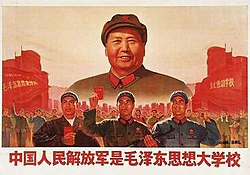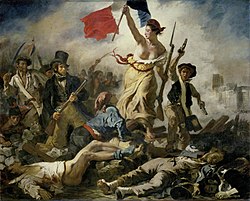 Global Information
Global InformationCultural Revolution information
 Propaganda poster depicting Mao Zedong, above a group of soldiers from the People's Liberation Army. The caption reads, "The Chinese People's Liberation Army is the great school of Mao Zedong Thought". | |
| Duration | 16 May 1966 – 6 October 1976 (10 years and 143 days) |
|---|---|
| Location | China |
| Motive | Preservation of communism by purging capitalist and traditional elements, and power struggle between Maoists and pragmatists. |
| Organized by | Chinese Communist Party Politburo |
| Outcome | Economic activity impaired, historical and cultural material destroyed. |
| Deaths | Estimates vary from hundreds of thousands to millions (see § Death toll) |
| Property damage | Cemetery of Confucius, Temple of Heaven, Ming tombs |
| Arrests | Jiang Qing, Zhang Chunqiao, Yao Wenyuan, and Wang Hongwen |
| Cultural Revolution | |||||||||||||||||||||||||||||||||||||||||
|---|---|---|---|---|---|---|---|---|---|---|---|---|---|---|---|---|---|---|---|---|---|---|---|---|---|---|---|---|---|---|---|---|---|---|---|---|---|---|---|---|---|
| Chinese | 文化大革命 | ||||||||||||||||||||||||||||||||||||||||
| Literal meaning | "Great Cultural Revolution" | ||||||||||||||||||||||||||||||||||||||||
| |||||||||||||||||||||||||||||||||||||||||
| Formal name | |||||||||||||||||||||||||||||||||||||||||
| Simplified Chinese | 无产阶级文化大革命 | ||||||||||||||||||||||||||||||||||||||||
| Traditional Chinese | 無產階級文化大革命 | ||||||||||||||||||||||||||||||||||||||||
| Literal meaning | "Great Proletarian Cultural Revolution" | ||||||||||||||||||||||||||||||||||||||||
| |||||||||||||||||||||||||||||||||||||||||
| History of the People's Republic of China |
|---|
 |
|
1949–1976 |
|
1976–1989 |
|
1989–2002 |
|
2002–2012 |
|
2012–present |
| History of |
|
|
|
|
| Part of a series on |
| Political revolution |
|---|
 |
|
|
The Cultural Revolution, formally known as the Great Proletarian Cultural Revolution, was a sociopolitical movement in the People's Republic of China (PRC). It was launched by Mao Zedong in 1966 and lasted until his death in 1976. Its stated goal was to preserve Chinese communism by purging remnants of capitalist and traditional elements from Chinese society. Though it failed to achieve its main objectives, the Cultural Revolution marked the effective return of Mao to the center of power in China after his political sidelining in the aftermath of the Great Leap Forward and the Great Chinese Famine.
In May 1966, with the help of the Cultural Revolution Group, Mao launched the Revolution and said that bourgeois elements had infiltrated the government and society with the aim of restoring capitalism. Mao called on young people to bombard the headquarters, and proclaimed that "to rebel is justified". Mass upheaval began in Beijing with Red August in 1966. Many young people, mainly students, responded by forming cadres of Red Guards throughout the country. A selection of Mao's sayings were compiled into the Little Red Book, which became revered within his cult of personality. In 1967, emboldened radicals began seizing power from local governments and party branches, establishing new revolutionary committees in their place. These committees often split into rival factions, precipitating armed clashes among the radicals. After the fall of Lin Biao in 1971, the Gang of Four became influential in 1972, and the Revolution continued until Mao's death in 1976, soon followed by the arrest of the Gang of Four.
The Cultural Revolution was characterized by violence and chaos across Chinese society, including a massacre in Guangxi that included acts of cannibalism, as well as massacres in Beijing, Inner Mongolia, Guangdong, Yunnan, and Hunan.[1] Estimates of the death toll vary widely, typically ranging from 1–2 million. Red Guards sought to destroy the Four Olds (old ideas, old culture, old customs, and old habits), which often took the form of destroying historical artifacts, cultural and religious sites, and targeting others deemed to be representative of the Four Olds. Tens of millions were persecuted, including senior officials: most notably, president Liu Shaoqi, as well as Deng Xiaoping, Peng Dehuai, and He Long. Millions were persecuted for being members of the Five Black Categories. Intellectuals and scientists were considered to be the Stinking Old Ninth, and many were persecuted. The country's schools and universities were closed, and the National College Entrance Examination were cancelled. Over 10 million youth from urban areas were relocated under the Down to the Countryside Movement policy.
In December 1978, Deng Xiaoping became the new paramount leader of China, replacing Mao's successor Hua Guofeng. Deng and his allies introduced the Boluan Fanzheng program and initiated reforms and opening of China, which gradually dismantled the ideology of Cultural Revolution. In 1981, the Communist Party publicly acknowledged numerous failures of the Cultural Revolution, declaring it "responsible for the most severe setback and the heaviest losses suffered by the people, the country, and the party since the founding of the People's Republic." Given its broad scope and social impact, memories and perspectives of the Cultural Revolution are varied and complex in contemporary China. It is often referred to as the "ten years of chaos" (十年动乱; shí nián dòngluàn) or "ten years of havoc" (十年浩劫; shí nián hàojié).[2][3]
- ^ Cite error: The named reference
Song-2011awas invoked but never defined (see the help page). - ^ "Translation Glossary for the CR/10 Project" (PDF). University of Pittsburgh. Retrieved 28 November 2023.
- ^ Lu, Xing (2004). Rhetoric of the Chinese Cultural Revolution: The Impact on Chinese Thought. p. 2.
Known to the Chinese as the ten years of chaos [...]